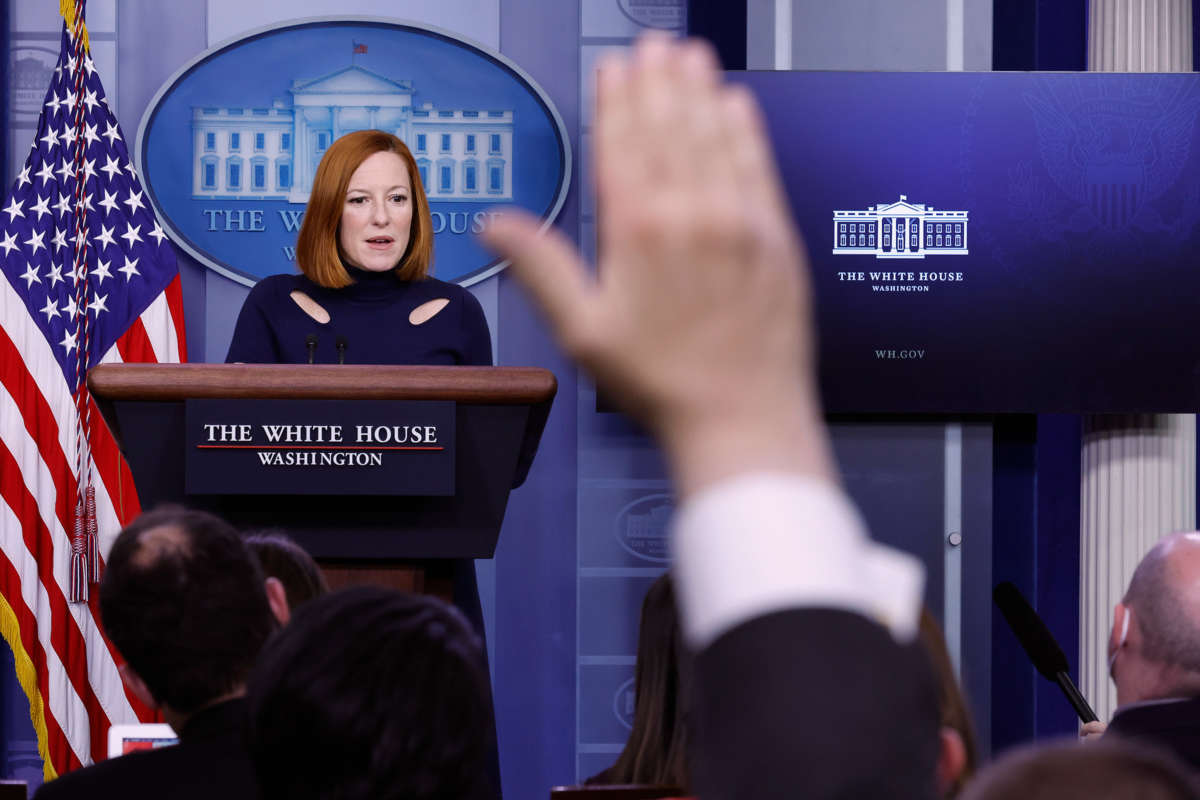White House Press Secretary Jen Psaki recently announced that the Biden administration is not planning on extending the student loan payment pause, sparking outrage among debt advocates and people who have struggled with student loan repayments for years.
A video of Psaki promising that the administration will soon reveal its plan regarding student debt payments circulated on Twitter over the weekend, garnering 1.7 million views as of Monday.
“We’re still assessing the impact of the Omicron variant,” Psaki said. “A smooth transition back into repayment is a high priority for the administration.” The administration is planning to allow the student debt payment pause to expire at the end of January. The pause, which was implemented to aid borrowers as the economy was rocked by the pandemic, has been in place since March of 2020.
.@PressSec: “In the coming weeks, we will release more details about our plans. A smooth transition back into repayment is a high priority for the administration.” pic.twitter.com/RYfurc38CR
— Tracking Biden From The Left (@BidenTracking) December 10, 2021
The Biden administration’s announcement comes just as the movement for lawmakers to take action on the student debt crisis is surging. Many advocates and borrowers have expressed frustration over the administration’s failure to act.
“I’m angry at Biden backtracking on a key pillar he ran on: cancellation. I’m fearing what the end of [the] moratorium will do for so many people,” wrote Debt Collective member Wen Zhuang. Other Twitter users noted that allowing repayments to start during a critical election year is a poor strategy for the nation’s top Democrats.
The Congressional Progressive Caucus called on the White House to take action, saying “45 million Americans are stuck in the student debt trap. It’s preventing them from buying homes, starting families, and investing in their communities. [President Joe Biden] has the authority to take action today. He should use it, and provide millions with desperately needed relief.”
On the campaign trail, Biden promised that he would cancel up to $10,000 of student debt per borrower. But the Biden administration hasn’t just refused to cancel student debt– it’s also lied about the president’s ability to do so. During press conferences, Psaki has consistently shifted responsibility away from Biden by saying that Congress should pass a bill to cancel debt instead, despite knowing full well that it would be nearly impossible for progressives and Democrats to pass such legislation.
Debt cancellation advocates have repeatedly pointed out that Biden could cancel federal student debt with a stroke of his pen, a much more reliable strategy than trying to pass the measure through Congress. Legal experts have also said that Biden has the authority to cancel student debt, which is perhaps the reason his administration has hidden an Education Department memo on the legality of the action for months.
Individuals are often forced to pay significant portions of their income in order to make payments, making student debt an enormous burden to many of the roughly 44.7 million Americans who are currently trying to pay off loans. Often, these payments don’t seem to have any set ending; many borrowers have reported that they’ve paid off more than they originally owed but that they still owe several times their original loan amount anyway.
These loans also hold borrowers back from being able to participate in many parts of the economy. Loans often affect borrowers’ credit scores, endangering their ability to buy a home or secure housing. Cancelling debt, meanwhile, could help raise incomes and stimulate the economy by freeing up thousands of dollars for borrowers.
According to recent data, the vast majority of student debt holders are not ready to restart payments. In a Student Debt Crisis Center survey of over 33,000 borrowers, 89 percent of borrowers who are employed full-time said that they aren’t financially ready to restart student loan payments in February.
Restarting payments will sap borrowers out of billions of dollars. A recent report done for Senate Majority Leader Chuck Schumer (D-New York) and Sen. Elizabeth Warren (D-Massachusetts) found that restarting payments will cost borrowers $7 billion a month and about $85 billion a year. On the other hand, the analysis found that canceling student loans could add over $173 billion to the Gross Domestic Product each year.
Although Biden has refused to answer lawmakers’ and activists’ calls to cancel student debt, there are steps his administration can take to ease the burden on borrowers. Last month, Warren and Sen. Bernie Sanders (I-Vermont) called on the Department of Education to move over 8 million borrowers out of default status for their loans before payments restart. “Allowing payments and collections to resume without taking these actions to protect borrowers in default would undermine our economic recovery,” the lawmakers wrote in a letter.
Trump is silencing political dissent. We appeal for your support.
Progressive nonprofits are the latest target caught in Trump’s crosshairs. With the aim of eliminating political opposition, Trump and his sycophants are working to curb government funding, constrain private foundations, and even cut tax-exempt status from organizations he dislikes.
We’re concerned, because Truthout is not immune to such bad-faith attacks.
We can only resist Trump’s attacks by cultivating a strong base of support. The right-wing mediasphere is funded comfortably by billionaire owners and venture capitalist philanthropists. At Truthout, we have you.
We’re in the midst of a fundraiser, and as of right now, we have until midnight to raise $10,000. Please take a meaningful action in the fight against authoritarianism: make a one-time or monthly donation to Truthout. If you have the means, please dig deep.
